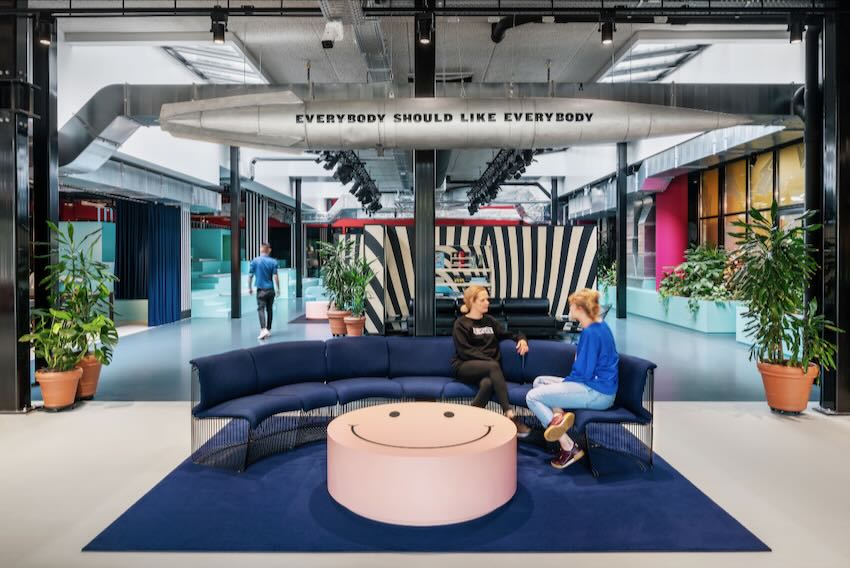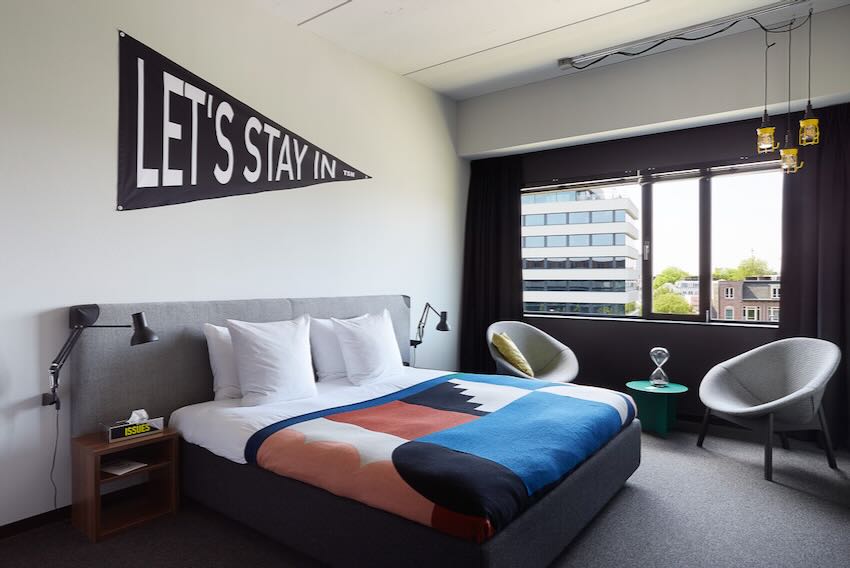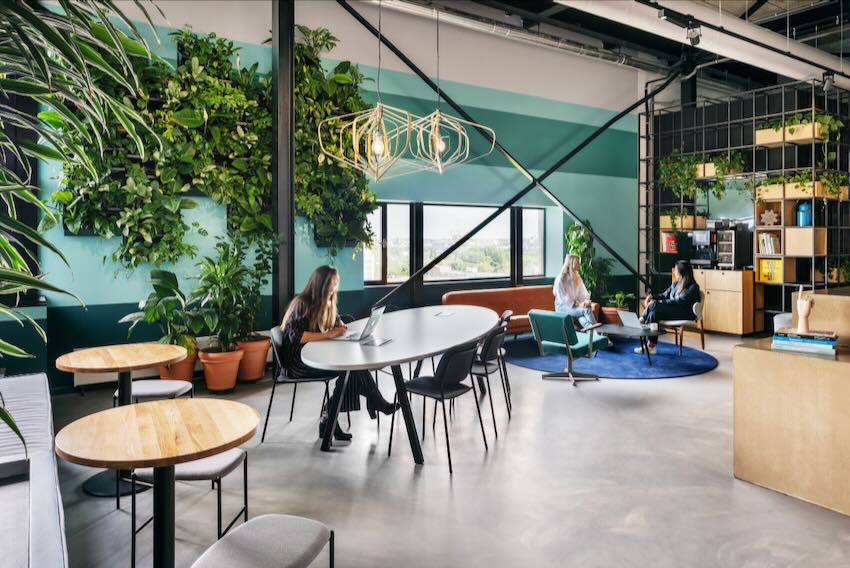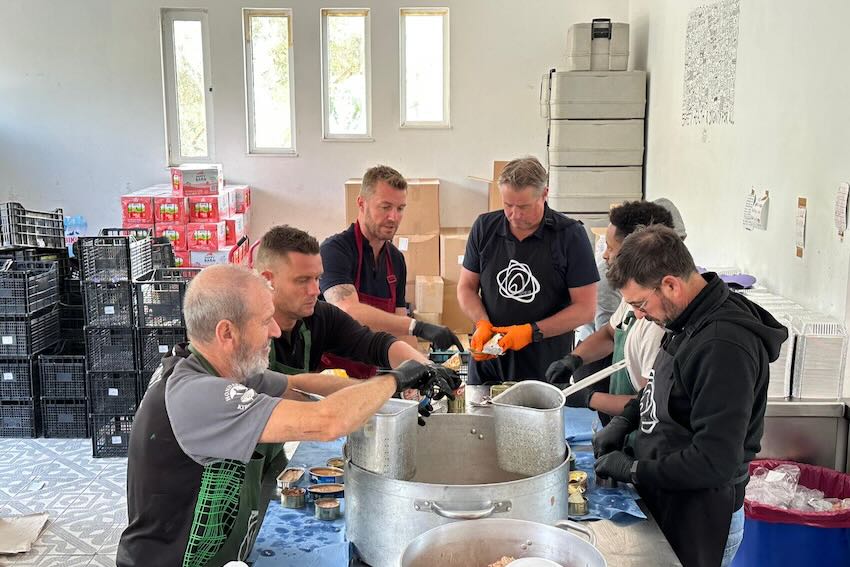
About: The Social Hub group of hotels is the creation of Charlie MacGregor who saw that hotels were an opportunity to bring different people from different backgrounds, races and cultures together and celebrate differences, and enjoy and learn from each other’s company. The Social Hub is not a hotel focussed on business travellers or created for leisure travellers or students – it is a pioneering hybrid concept welcoming all of these people at the same time – a melting pot of students studying in Amsterdam, business travellers meeting colleagues and clients, and families and friends spending a few days exploring the city. The idea is that everyone is welcome just as society should be – one big family. Students can stay at the Social Hub for up to one year with private bathroom, spaces to work and relax, gym use, free bike-sharing and laundry included.
The Social Hub’s total locations amount to 23, including 17 hotels and over 10,000 rooms currently operating in Amsterdam (two hubs), Barcelona, Berlin, Bologna, Delft, Eindhoven, Florence, Groningen, Maastricht, Madrid, Paris, Rotterdam, San Sebastián, The Hague, Toulouse, and Vienna. Six hubs are currently in development and opening in 2024 in Glasgow, Porto & Florence Belfiore, Rome in 2025, and Lisbon and Turin further ahead.
Arrival: A few days before my stay I received an email from the hotel explaining how to get there, what events were on and what to expect on arrival. I travelled by metro from Amsterdam Central station and the Metro stop Wibautstraat is just a couple of minutes walk from the hotel.
First impressions were an imposing set of grey blocks – the building was once home to the newspapers Het Parool and Trouw and there are references to this heritage throughout. It was also a popular night club for five years by the Trouw name and there are a few clues to this on the lower ground floor.
As I stepped through the doors the austere facade was forgotten in an instant – I was welcomed with a bright large open plan reception, cafe and ‘play area’. There were people enjoying a game of table tennis and others chatting in the cafe, or sitting listening to music, or working in neat little booths. The shop sells fair trade coffee and goods like hoodies, caps and bags by the Movement Market which supports the hotel group’s longstanding partner, Movement on the Ground (MOTG), a foundation dedicated to responding to humanitarian crises.
To the right there are two check in tables where I was offered a glass of Prosecco and there are freshly baked cookies on a plate for anyone to enjoy. The stations are staffed 24/7. There is a small vending machine and shop with basic supplies in the checkin area. The hotel is cashless.
How many rooms? 571 of which the number of student/extended stay and hotel deviate throughout the year. From the end of June until beginning September all 571 are ‘regular’ hotel rooms but outside of summer the hotel offers 324 hotel rooms and 247 rooms for students to stay longer term. Extended stay rooms include kitchenettes.
The room: I got to my room via the elevator in the lobby using my wooden room key to get access to the lift. I was on the fifth floor. Corridors are wide with low level lighting. My room was a large contemporary minimalist space with a desk and clothes rail and an ensuite with shower. The shower measures how much water each guests uses (more on this in the sustainable initiatives section below).
As with the rest of the hotel the room decor was effortlessly stylish and playful. A cluster of lightbulbs hung in the corner and a book about the hotel and its charity Movement on the Ground was an inspiring read. The tissue box was called the “issue box” and I also enjoyed turning the enormous glass sand timer on the shelf. There was a kettle and coffee machine, but no mini bar fridge and the main light switches, which were dimmable, were labelled to remind you about energy and the environment. All lights go off when the room is empty.

Breakfast: Breakfast is served in the restaurant next to the lobby. It’s a large bar area with a striking lighting installation – luminous angled batons a bit like light sabres in flight – and when I took my seat there was some low key chilled music playing. There are different food stations with beautifully presented options, from pastries to cold meats and yoghurts, fruits and cereals. Hot breakfast included boiled eggs, scrambled eggs, sausages, hash browns and bacon. There were smoothies and fruit juices and a self service coffee and tea station. The hotel has the Orbisk food waste system, which weighs and calculates food waste each day so that the chefs can work to reduce waste. The group also uses Too Good To Go in its Netherlands properties and with its Hubs live on the platform, people can reserve a breakfast box filled with delicious leftovers from the breakfast buffet.
Working: For those who need to work during their stay the options are numerous. My room had a desk with everything I needed to sit quietly, but if you want more interaction, there are co working spaces and meeting rooms downstairs where you can hire desks for the day or longer, as well as private offices. Taking up the entire 13th floor is a co working space offering a communal kitchen, as well as relaxed seating area to chat in between calls. There are far reaching views across the city from the offices and meeting rooms. The Social Hub Amsterdam City recycles all its Nespresso cups in the hotel rooms and meeting rooms so the old coffee can be used as new energy sources, while the cups will be repurposed into new aluminium objects – like the bicycles. The hotel lends bicycles to guests to get around the city more sustainably.

Events: The hotel has so many options when it comes to events. From a meeting with a coffee in the cafe to a 350-person conference. The lobby is a versatile space for events with the capacity for 300 people. There is also a 160-capacity theatre, a Media Studio and the 13th floor co working space with views across the city.
As the name suggests the hotel is much more than a place to work, play and sleep. It’s also a venue for many community experiences developed by the hotel and events that align with international awareness moments, such as Black History Month, World Cultural Diversity Day, Pride and more. During my stay I joined a “breaking the fast” Ramadan feast in a large event space downstairs. We sat at long tables chatting and sharing delicious Middle Eastern food.
The Social Hub’s charity partner Movement on the Ground also presented a short video showing its work in Lesbos with refugees. Everyone works together to educate and learn skills for life as residents rather than refugees – creating a “safe, healing and enabling environment”. Staff from Social Hub properties, and other volunteers, regularly to work on the Camp to Campus programme. See some communal cooking below. Check out the details of the Camp to Campus here.

Sustainability Initiatives: All Social Hub hotels have the objective to become zero-waste and reduce scope 1 and 2 emissions by 80 per cent by 2030. The sustainability team is currently finalising the SBTI targets and will be communicating those soon. As we discussed in our chat with founder Charlie MacGregor (see the Q&A below), The Social Hub is in the process of achieving B Corp Status – it started the process last year.
At the Amsterdam City hotel the showers have a digital measurement on them, which shows how many litres of water are being used – alongside an image of a polar bear standing on an iceberg. The longer you take in the shower the more likely the polar bear’s iceberg will melt and fall away leaving it stranded. I was shocked to see I used 19 litres of water for my short shower. My polar bear was still standing but it was a wake up call to how much water we all use. According to the Sustainable Hospitality Alliance a hotel can use an average of 1,500 litres per room per day.
Highlights of the Social Hub’s impact report 2021-2022 include:
- The installation of solar panels on the rooftop of hubs in Barcelona, Madrid and Toulouse;
- Reducing the company’s carbon emissions from corporate air travel by 26 per cent compared to FY19-20. Partnering with WeForest to compensate for these emissions has led to 30,000 trees being planted;
- By purchasing toilet roll from The Good Roll, which donates 50 per cent of its net propfit to building toilets in Africa, The Social Hub contributed to the development of one and a half toilets in 2022 which impacted on 75 people’s lives and saved four trees from being used for toilet paper;
- Through the group’s partnership with Made Blue, 94,604,300 litres of clean drinking water to date, has been donated to communities in Africa meaning 1,296 people have access to water;
- 662 tonnes of CO2 emissions were prevented from being emitted;
- 946 kg of plastic saved from going to waste;
- 14,191 trees saved from logging;
- The group is working on its DEI initiatives – although strides ahead of many hotel groups, it is working with the Inclusion Factory to keep improving. All new hubs now have a DEI workshop training for staff. As a result, the group trained three new teams in Barcelona, Madrid and Toulouse.
- The group is hoping to improve on its Global Real Estate Sustainability Benchmark (GRESB) score for its assets in development. Its score went down from 86 to 78 in 2022 but it increased its score for its standing assets from 75 to 78.
Gym and Swim: In the basement there is a swimming pool and a gym, run separately from the hotel, which guests can pay to use.
Catching the Zzzs: When we review hotels for their sustainability initiatives we still need to get some sleep. This is the reason we stay in hotels after all. Leaving the warm social buzz downstairs my room was peaceful and calm. Eye masks are provided but the room’s curtains did a great job of keeping out daylight. I slept well and woke early to catch up on some work with a cup of tea I made using the facilities in the room.
Future: The group plans to open another 25 hotels with new investors. The company is working on becoming a B-Corp. The Social Hub is also creating a membership programme, scholarship fund and more ways to communicate its positive impact and purpose.
Felicity Cousins stayed at the Social Hub Amsterdam City in mid March 2024.

